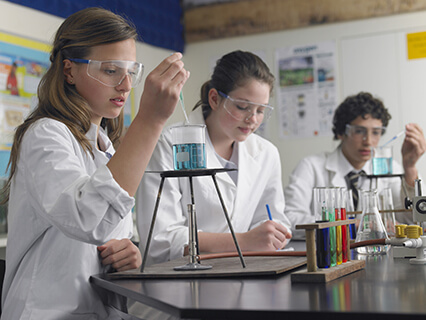This is a lesson summary. The full lesson can be viewed by purchasing an online course subscription.
Learning Objective
In this lesson we will learn how scientific knowledge is accumulated through a rigorous and methodical process of inquiry.
Learning Outcomes
By the end of this lesson you will be able to:
- Describe the steps involved in the scientific method.
- Define qualitative and quantitative observation, inference and prediction.
- Describe how a fair test is conducted, including independent and dependent variables, control variables, test groups and control groups.
- Explain how the accumulation of scientific knowledge may lead to theories or laws, and differentiate between the two.

(Image: biker3, Adobe Stock)
Lesson Summary
- The scientific method is a systematic approach that characterises the way in which scientific knowledge is acquired.
- The main steps in the scientific method are:
- Making an observation.
- Making an inference and prediction.
- Conducting an experiment.
- Developing a theory or law.
- An observation involves noticing and recording a particular occurrence.
- Qualitative observations relate to qualities and involve descriptions. They are subjective and usually involve our senses.
- Quantitative observations relate to quantities and involve measurements. They are objective and involve numerical values and units of measurement.
- An inference is an interpretation of an observation and an attempt to explain it.
- A hypothesis is a prediction based on an inference.
- A fair test or controlled experiment is an investigation that tests a hypothesis.
- A variable is any factor that can change during an experiment.
- A dependent variable is a factor being measured during an experiment.
- An independent variable is the factor being investigated during an experiment, by observing what effect it has on the dependent variable.
- A control variable is any factor kept constant during an experiment.
- A test group (experimental group) has a modified form of the independent variable in an experiment.
- A control group has an unmodified form of the independent variable in an experiment.
- Following an experiment, a hypothesis is either accepted or rejected, or may require further testing if the results are inconclusive.
- Experimental results often create new questions that can be tested.
- The acquisition of scientific knowledge is a continual process.
- When a hypothesis is tested multiple times with the same result, it may lead to the development of either a theory or a law.
- A theory is an explanation of some aspect of the natural world that has been well-substantiated by multiple tests.
- A theory is an interpretation that can evolve as new evidence is acquired. However, it can never become a law.
- A law is a descriptive generalisation about some aspect of the natural world that holds true all of the time.
- A law is constant and not subject to change.
- A scientific fact is an occurrence that has been repeatedly confirmed by testing.

(Image: jarmoluk, Pixabay)
(Header image: Blue Planet Studio, Adobe Stock)
